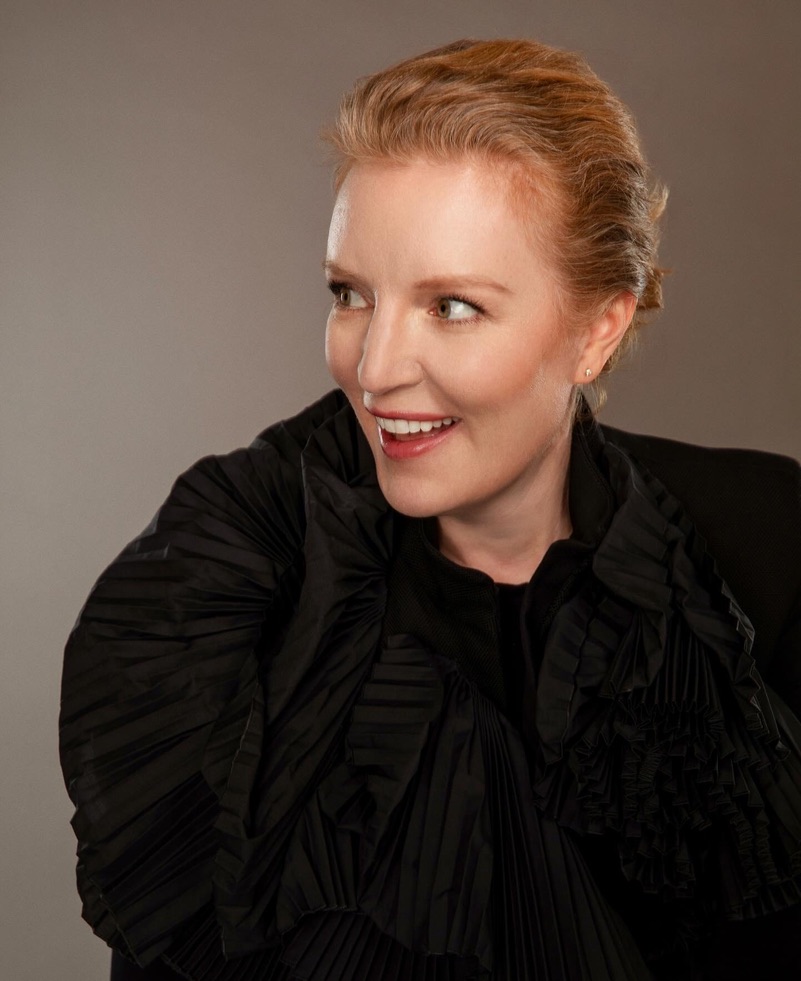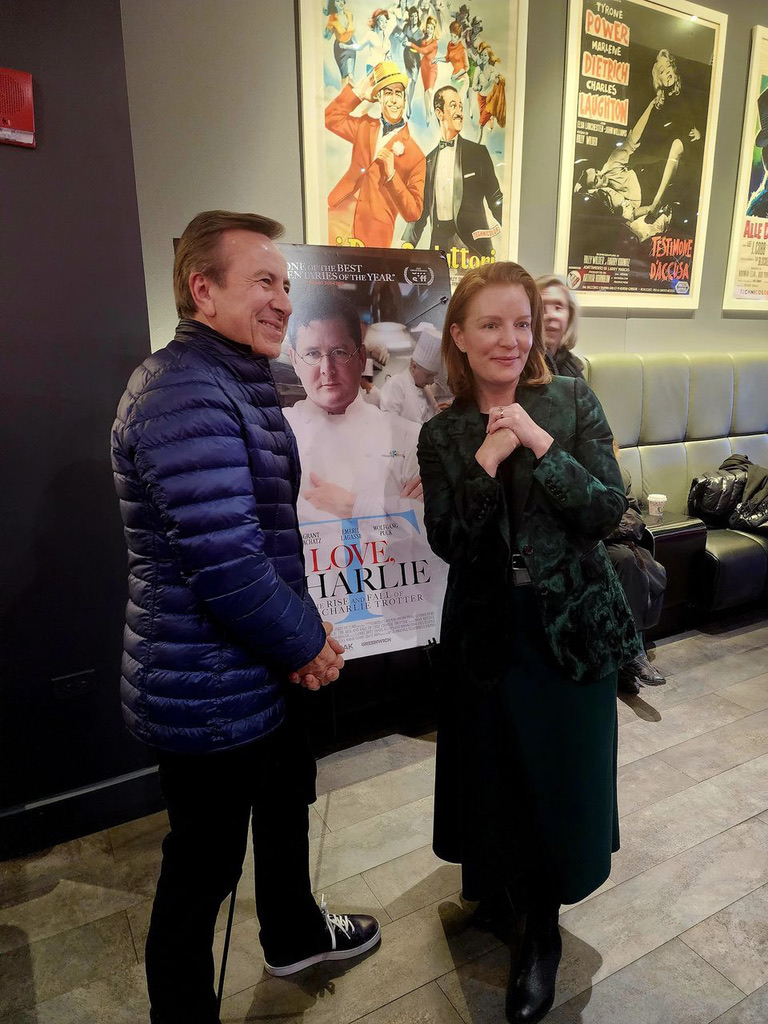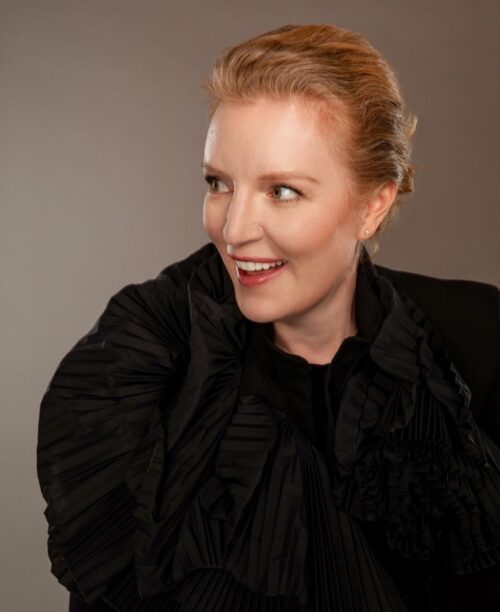
By David A. F. Sweet
Working in the mailroom of a Hollywood talent agency is one of the most famous low-paying jobs in the United States. Many young adults burn out and quit after long days and dull chores; others, such as Barry Diller and Michael Ovitz, endure and eventually become celebrated media executives.

“I always look for: What are the universal themes behind those stories that would appeal to an audience?” says documentary filmmaker Rebecca Halpern. Photo by Robyn Von Swan.
Armed with a theater degree from Northwestern University, Rebecca Halpern joined William Morris Endeavor in its Los Angeles mailroom in the 1990s, answering phones and fetching coffee for more than two years. In an unexpected way, that job set her on a path to become a documentary filmmaker.
“I dealt with a lot of people on the scripted side – the fictional side of the business,” said Halpern from her Los Angeles home, where she lives with her husband, comedian Hal Rudnick, and their one-year-old daughter Eden. “I wanted something more substantive than what fiction was giving me. There were a lot of true stories getting traction at the time, and when you can find a true story that’s stranger than fiction, that’s often better.”
Today, the Winnetka native is a major player in the documentary world. She has tackled dark topics, such as the murder spree inspired by Charles Manson in the six-part series Helter Skelter, where she served as co-executive producer, and Mastermind: To Think Like a Killer, which she created. She directed, produced and wrote for the Netflix series How to Become a Mob Boss. She produced and wrote the feature documentary Who Is Stan Smith? about the 1960s tennis star best known for his shoe line, which appeared in theaters this spring.
What interests her in such a variety of topics?
“There are compelling characters, and there are compelling stories. When you find all of that rolled into one, you know,” she said. “I always look for: What are the universal themes behind these stories that would appeal to an audience?”
Though Helter Skelter is a harrowing subject – random stabbings in an affluent Los Angeles neighborhood in 1969 – Halpern was pleased the documentary illuminated why the story still captures people’s imagination.
“It was really the first true-crime drama that played out in the media,” she said. “It’s easy to see why people fell for Charles Manson. If you had told me in my life, I’d go grocery shopping with one of the Manson girls (to learn about him), I would have said ‘No way.’”
Around her childhood home, Halpern is likely best known for Love, Charlie, which won Best of the Fest at the 2021 Chicago International Film Festival and became available on Netflix this year. Though Halpern never dined at Charlis Trotter’s (she did once grab Thanksgiving dinner from Trotter’s To Go), her mother Madeline, a food writer, cooked in his kitchen. Halpern recalls hearing about him like he was a “mythological figure” when she attended New Trier High School.

Halpern gets together with chef Daniel Boulud at the New York premier of Love, Charlie, about Chicago chef Charlie Trotter.
But on the first day of film production in 2020, Illinois shut down because of the pandemic.
“It gave me a lot of time to go through every piece of archival material,” Halpern recalled. “His sister had all this memorabilia in her home, and I spent a couple of days going through it. We really scoured the world looking for as much as we could to tell the definitive story of this man.”
Despite that tireless research, once Love, Charlie appeared, Halpern was criticized for not interviewing his son, Dylan, or the second and third wives of the troubled restaurateur, who died at 54.
“You didn’t need to. He couldn’t keep his personal life on the rails,” she explained. “In the recent Tiger Woods documentary, they tried to knock him down a peg by interviewing his mistress and high school girlfriend. That’s not the kind of story I’d ever want to tell.”
There are two parts about making a documentary that excite Halpern.
“One is when I identify an idea that no one has ever done before,” she said. “The key to making great documentaries is access – to people, to materials, to some world no has ever seen before. When I have the idea and find out that someone may be willing to share the story with me, that’s a thrilling part of my job.
“The other is I love pitching my projects. You have a verbal pitch, a deck on paper, and a sizzle reel, which is a two-minute trailer for your idea. The best compliment I can get from an executive is when they say to me, ‘Wow. When you were describing the idea to me, what I saw in the sizzle reel is exactly what I imagined.”’
In an interesting twist, it was one of Halpern’s jobs in a non-media environment – a year spent creating proposals in the marketing department of her father Richard’s construction company, The Rise Group – that has helped her pitches today.
“It was a great training ground for making my own proposals for my own projects,” said Halpern, whose father helped build the Willis Tower, McCormick Place and other Chicago landmarks during a long career. “The work of the construction manager and the film producer is so similar.”
A stalwart on the Northwestern golf team, Halpern still plays today – in fact, she recently recorded her second hole in one, this time at Hillcrest Golf Club in the Los Angeles area.
“I love the memories that golf gives me – including memories with my Dad growing up and in college,” she said. “My Dad walked lockstep with me down every fairway in competition.”
After she returned to Northwestern to procure a master’s degree in broadcast journalism and magazine publishing in the early 2000s, she eventually worked full-time with documentary filmmakers Jonathan Towers and Bill Kurtis. She served as a producer, writer and director on Kurtis’ American Greed that appeared on CNBC.

Halpern — who starred on the Northwestern University women’s golf team — still loves to play today.
“It was through them that I really learned how to tell a great story,” she said. “Towers and Kurtis both really knew how to write compelling true-crime stories, which is no easy task. Building mystery and tension, creating believable red herrings, and taking viewers on an emotional roller coaster are all hallmarks of great true-crime writing.
“Without that experience, I don’t think I’d be here today.”
Unsung Gems Columnist David A. F. Sweet can be reached at dafsweet@aol.com.







